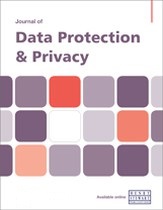Transparency, automated decision-making processes and personal profiling
Abstract
Automated decision-making and profiling techniques provide tremendous opportunities to companies and organizations; however, they can also be harmful to individuals, because current laws and their interpretations neither provide data subjects with sufficient control over assessments made by automated decision-making processes nor with sufficient control over how these profiles are used. Initially, we briefly discuss how recent technological innovations led to big data analytics, which through machine learning algorithms can extract behaviours, preferences and feelings of individuals. This automatically generated knowledge can both form the basis for effective business decisions and result in discriminatory and biased perceptions of individuals’ lives. We next observe how the consequences of this situation lead to lack of transparency in automated decision-making and profiling, and discuss the legal framework of this situation. The concept of personal data in this section is crucial, as there is a conflict between the 29 Working Party and the European Court of Justice at the time to define the artificial intelligence (AI)-generated profiles and assessments as personal data. Depending on whether they are or are not personal data, individuals have the right to be notified (Articles 13–14 GDPR) or right to access (Article 15 GDPR) to inferenced data. The reality is that the data protection law does not protect data subjects from the assessments that companies make through big data and machine learning algorithms, as users lose control over their personal data and do not have any mechanism to protect themselves from this profiling owing to trade secrets and intellectual property rights. Finally, we discuss four possible solutions to lack of transparency in automated inferences. We explore the impact of a variety of approaches ranging from use of open source algorithms to only collecting anonymous data, and we show how these approaches, to varying degrees, protect individuals as well as let them control their personal data. Based on that, we conclude by outlining the requirements for a desirable governance model of our critical digital infrastructures.
The full article is available to subscribers to the journal.
Author's Biography
Manuela Battaglini is a data ethics lawyer, strategic marketer and CEO of the company Transparent Internet. She helps businesses and organisations to identify why, how and with which transparent and ethical technologies they can simultaneously increase market reach as well as client trust and benefits to society. Manuela initially worked as a lawyer for 10 years. In 2008, she engaged in the world of strategic digital marketing where she has, over the years, acquired deep knowledge about the inner working of online platforms and big data. Over recent years, she has combined these areas of expertise, as she understands the nexus of law, marketing and technology. Recently, she has founded a company, Transparent Internet, combining law, data ethics, marketing and technology to help companies and organisations develop, implement and use technology in a more transparent and ethical manner while at the same time increase their commercial edge. Manuela believes that if more organisations develop and implement technology in a more ethical and transparent manner, we will enhance personal freedom, trust, tolerance and sustainability. And this is the world she wants to live in.
Steen Rasmussen is a professor in physics and a centre director at the University of Southern Denmark as well as an external research professor at the Santa Fe Institute in New Mexico, USA. Professor Rasmussen’s research interests include the physics of living and intelligent processes, development of protocells, technology evolution, and the societal impact of living and intelligent technologies. He has co-authored 121 peer-reviewed scientific journal papers, edited 10+ books and proceedings, given 200+ invited talks and 130+ media interviews, and written 30+ consulting and internal reports. He has received many rewards for his work, starting in 1988 with P. Gorm-Petersens Mindelegat in the presence of Her Majesty the Queen, Margrethe II of Denmark, and most recently in 2018 with a Lifetime Achievement Award from the International Society for Artificial Life (ISAL). Since 2003, he has won US$39m in competitive research grants to his home institutions and international research consortia in the USA, EU and Denmark. Starting 2007, he has consulted on science and technology issues for the European Commission, the Danish Parliament, the German Reichstag, the US Congress as well as private organisations. He is co-founder of the companies BINC Technologies and Transparent Internet.
